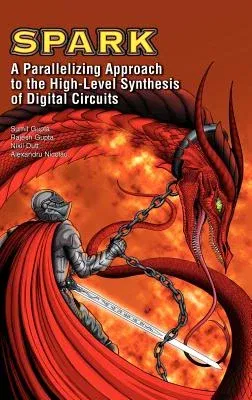Rapid advances in microelectronic integration and the advent of
Systems-on-Chip have fueled the need for high-level synthesis, i.e., an
automated approach to the synthesis of hardware from behavioral
descriptions.
SPARK: A Parallelizing Approach to the High - Level Synthesis of
Digital Circuits presents a novel approach to the high-level synthesis
of digital circuits -- that of parallelizing high-level synthesis
(PHLS). This approach uses aggressive code parallelizing and code motion
techniques to discover circuit optimization opportunities beyond what is
possible with traditional high-level synthesis. This PHLS approach
addresses the problems of the poor quality of synthesis results and the
lack of controllability over the transformations applied during the
high-level synthesis of system descriptions with complex control flows,
that is, with nested conditionals and loops.
Also described are speculative code motion techniques and dynamic
compiler transformations that optimize the circuit quality in terms of
cycle time, circuit size and interconnect costs. We describe the SPARK
parallelizing high-level synthesis framework in which we have
implemented these techniques and demonstrate the utility of SPARK's PHLS
approach using designs derived from multimedia and image processing
applications. We also present a case study of an instruction length
decoder derived from the Intel Pentium-class of microprocessors. This
case study serves as an example of a typical microprocessor functional
block with complex control flow and demonstrates how our techniques are
useful for such designs.
SPARK: A Parallelizing Approach to the High - Level Synthesis of
Digital Circuits is targeted mainly to embedded system designers and
researchers. This includes people working on design and design
automation. The book is useful for researchers and design automation
engineers who wish to understand how the main problems hindering the
adoption of high-level synthesis among designers.

